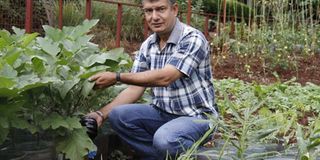Our small kitchen garden where we harvest in plenty

Vijay Kumar at his Kitchen garden farm in Parklands. Photo | JEFF ANGOTE
What you need to know:
- To set up the garden, the family bought a truck of red soil at Sh10,000 and cow dung in a pick up at Sh4,000 from a herder in Kitengela.
- The family makes between Sh5,000 to about Sh8,000 per harvest.
- To scare away birds from the garden, the family uses Compact Disks (CD) that act as scarecrows. “
Birds chirping, trees swaying and beautiful flowers welcome one to Vijay Kumar’s home in Parklands, Nairobi.
The flowers have been planted in an orderly fashion in the vast compound, specifically along a footpath that leads to the back of the house.
It is easier to pick out from the flowers that Kumar and his wife, Reena, are in love with plants. But it is at the back of their bungalow that their love for crops really stands out.
The Kumars have a kitchen garden where they grow various kinds of vegetables for domestic use and for sale.
The garden covering 100 by 25 metres is a spectacle to behold. Ripe tomatoes, green capsicum and fleshy egg plants dance to the cold winds of Nairobi’s June weather.
Other crops include onions, broccoli, cabbage, bullet chillies, garlic and ginger.
However, the farm is not your typical kitchen garden. While they have planted some of the crops on the ground, most of them are in plastic containers.
The couple is using those crops planted on the ground as a control experiment so that they can compare with those crops grown in containers.
And the difference is visible. The plants in the plastic containers are healthy and have lush green leaves. “My tenant Deepak Bij advised me to consider the container farming method to set up a garden for my family. Now I see the sense in his advice because the method helps in maximising space and one gets better yields. You do not need to have a large space to have a kitchen garden.”
Kumar shared the idea with his family and they assisted him in setting up the farm.
To set up the garden, the family bought a truck of red soil at Sh10,000 and cow dung in a pick up at Sh4,000 from a herder in Kitengela.
This mix made nutrient-rich soil. In their garden, the Kumars do not use any pesticides or artificial fertilisers.
“We use cow dung as manure. When we need to spray the plants to protect them from pests, we burn the cow dung and spray the smoke on the plants. This garden is organic and is quite cheap to manage.” To start, the Kumars mixed the manure and the soil in a ratio of one to two. The two were mixed thoroughly, watered and put in plastic containers after sometime.
Several seeds of different vegetables were planted in a nursery. They were later transplanted into the plastic containers.
“We bought about 1,000 used 10-litre water bottles from a company in Nairobi at Sh50 each. We then cut them into half, made holes at the bottom and then planted the geminating seedlings,” Kumar says.
They planted at least three seedlings in one container as the manure was sufficient.
The Kumars water the plants three times a week, mainly in the afternoons.
“We use about 100 litres of water for the about 800 plastic containers. Had it been in conventional planting, we would certainly be using much more,” Reena says.
“We harvest every week. For some plants like spinach, we get a leaf or two every day. I have fresh produce for family consumption and when we have collected enough, we give to friends and relatives as well as sell in Parklands. This is not a mere hobby for us; it is an source of income,” she says.
The containers are clustered in groups of 100 depending on the type of vegetable grown.
“We invested about Sh150,000 in the entire farm. The returns are not much but I must admit this is an investment that we will enjoy its fruits for a long time. What we buy periodically are seeds, for about Sh200 per packet and the cow dung, which we buy in the three months,” Kumar says.
The family makes between Sh5,000 to about Sh8,000 per harvest.
To scare away birds from the garden, the family uses Compact Disks (CD) that act as scarecrows. “We have tied the CDs on sticks with a rope and placed them in the garden. As the sunrays hit the plastic CDs, the reflections scare away birds. This also works for monkeys,” Bij, who manages Kumar’s farm says.
Prof Paul Kimurto, a crop expert at Egerton University, notes. “Cow dung has some pesticidal elements such as nitrogen and other minerals. When one burns it, the combustion combines the minerals with oxygen thus the smoke released is rich in compounds such as nitrous oxide, which keeps pests and diseases at bay. Therefore, it acts as an insecticide and this protects the plants.”
For kitchen gardens, the cow dung smoke is a good idea. For large scale farmers, however, it may not be advisable.”




